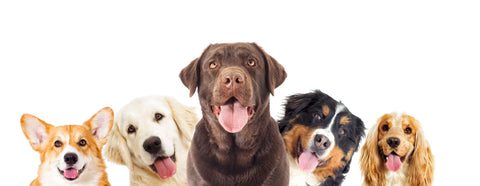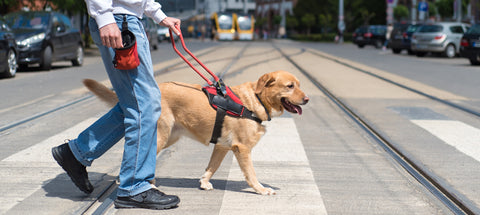What is muscle atrophy in dogs? It sounds alarming, but what does it look like and how can you help your four-legged friend?
From joint support to calming supplements and more, here at YuMOVE we cater to every pups needs. Discover our dog supplement range here.
What is muscle atrophy in dogs?
Muscle atrophy means when your dog's muscles weaken or waste away. It usually affects a dog’s back legs (thigh muscle atrophy), but it can also occur in other muscles too.
How to spot the first signs of muscle atrophy in your dog
If your dog is experiencing muscle atrophy, the first thing you’re likely to spot is that they’re not enjoying their walks in the usual way. It could be that they're finding it harder to walk normally, their legs might look stiff, and they may seem less comfortable moving around.
You may notice:
- Your dog’s hind legs seem thinner than before and they’re using their front legs more to compensate for this.
- Your dog has lost weight and/or it’s easier to pick them up.
- When you stroke your dog, the muscles feel flabby under their coat.
- Your dog might drag their paws.
- They might cross their legs as they stand or walk.
What dog breeds are more susceptible to muscle atrophy?

Certain dog breeds are more likely to suffer from types of ‘myopathy’, which are diseases that cause damage to their muscles and can lead to muscle atrophy. There are two main categories of these dog breeds: large dogs such as German Shepherds and sighthounds such as Greyhounds.
In the first category, German Shepherds are prone to Fibrotic Myopathy which causes weakness in their thigh muscles, Labrador Retrievers can be affected by Centronuclear Myopathy leading to muscle loss in their first year, and Great Danes can inherit a disorder that causes muscle wasting.
Some sighthounds are also affected by muscle loss, but for completely different reasons. When a breed such as a Greyhound experiences Exertional Myopathy, it’s usually because they have over-worked their muscles through intense activity.
If your pup is losing muscle mass...
If your dog suddenly loses a significant amount of muscle mass, we’d always recommend talking to your vet to find out if it’s a sign of a more serious underlying condition.
However, very often muscle atrophy in your dog is gradual, caused by the ageing process or a lack of activity. Put the two together – an older dog who’s not getting as much exercise – and you have a double whammy that could bring on the condition.
The causes of muscle atrophy in dogs
Let’s have a closer look at these two causes...
- Getting older. A certain amount of muscle atrophy is normal as your dog gets older. Like humans, older dogs produce less growth hormone as they age and are less able to break down and synthesise protein to help build their muscle mass.
- Lack of exercise. This is a case of ‘use it or lose it’. Your dog needs enough exercise to keep their joints, ligaments and muscles strong. Without the right amount of exercise, they risk losing muscle mass or long term muscle and joint issues.

How to support your dog through muscle atrophy
Once you’ve ruled out any serious underlying cause for your pet’s muscle loss, here are a couple of practical steps you can take to support your dog through their muscle atrophy and relieve any pain...
- Enjoy a relaxing walk together! Gentle exercise will help build your dog’s muscle tone and mass, so get their tail wagging again by taking your dog out for a gentle stroll. If your dog has been finding it difficult to walk far, take it easy to start with and ask your vet for advice on the right amount of exercise for your pooch.
- Give your dog the right diet. Additional weight will add more strain to your dog’s muscles and make it harder for them to walk. So make sure you feed them a wholesome, nutritious diet that will help them stay in good physical condition. Look out for foods that are high in protein and fat, and avoid those that are higher in carbohydrates and fillers
Get in touch
If you think your dog’s showing signs of stiffness, do get in touch to discuss how YuMOVE might be able to help. We’d love to hear from you. Just call us on 844 570 3222 or email us info@yumove.com.
Or take a look at our wide range of dog supplements here for not only joint health but anxiety & stress too.










